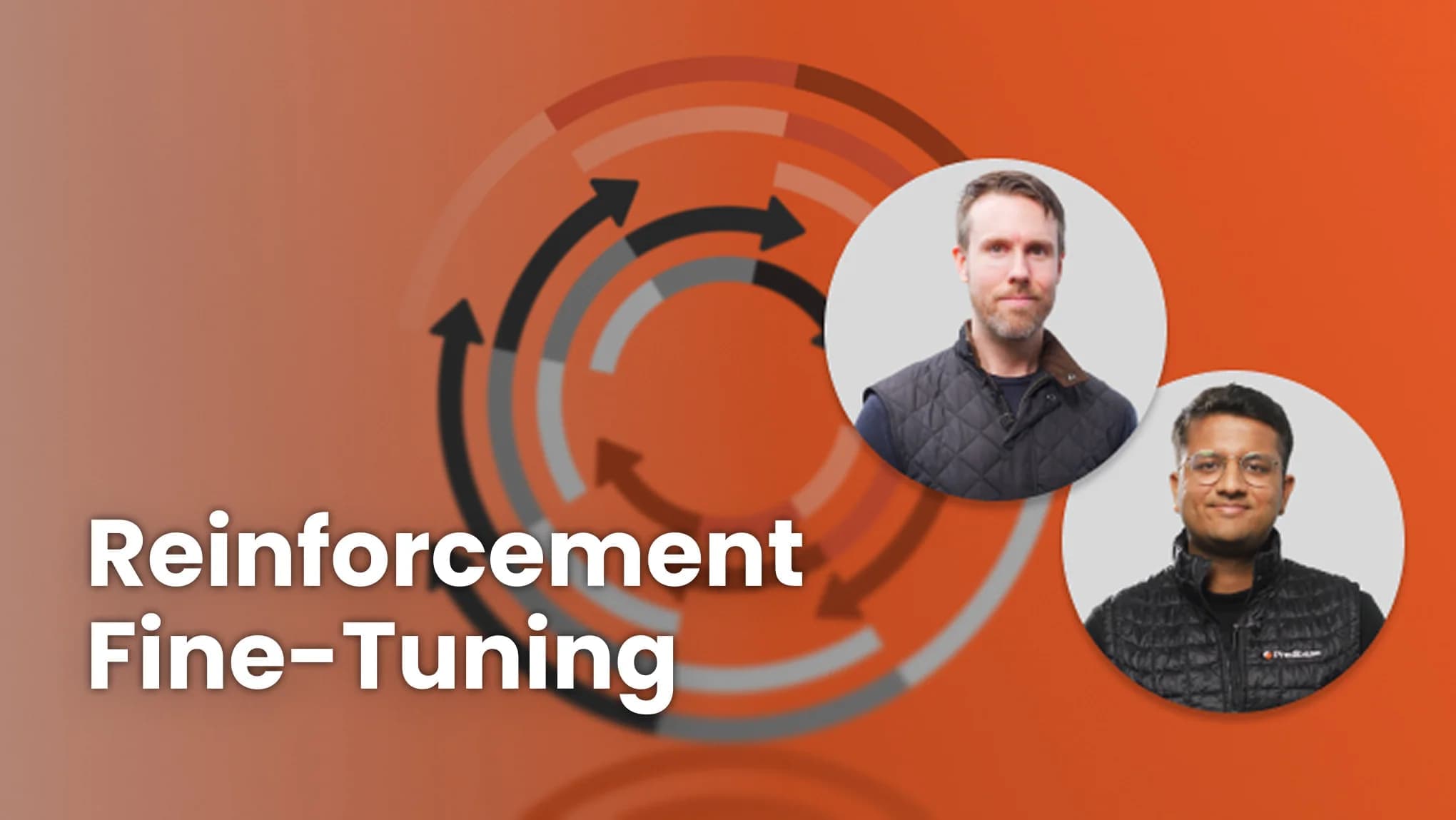Reinforcement Fine-Tuning LLMs with GRPO
Instructors: Travis Addair, Arnav Garg

- Intermediate
- 1 Hour 23 Minutes
- 10 Video Lessons
- 7 Code Examples
- Instructors: Travis Addair, Arnav Garg
What you'll learn
Learn the foundations of reinforcement learning and how to use the Group Relative Policy Optimization (GRPO) algorithm to improve reasoning in large language models.
Design effective reward functions, and learn how rewards are converted into advantages to steer models toward high-quality behavior across multiple use cases.
Learn to use LLM as a Judge for subjective tasks, overcome reward hacking with penalty functions, and calculate the loss function in GRPO.
About this course
Join Reinforcement Fine-Tuning LLMs with GRPO, built in collaboration with Predibase, and taught by Travis Addair, its Co-Founder and CTO, and Arnav Garg, its Senior Engineer and Machine Learning Lead.
Reinforcement Fine-Tuning (RFT) is a technique for adapting LLMs to complex reasoning tasks like mathematics and coding. RFT leverages reinforcement learning (RL) to help models develop their strategies for completing a task, rather than relying on pre-existing examples as in traditional supervised fine-tuning. One RL algorithm, called Group Relative Policy Optimization (GRPO), is beneficial for tasks with verifiable outcomes and can work well even when you have fewer than 100 training examples. Using RFT to adapt small, open-source models can lead to competitive performance on reasoning tasks, giving you more options for your LLM-powered applications.
In this course, you’ll take a technical deep dive into RFT with GRPO. You’ll learn how to build reward functions that you can use in the GRPO training process to guide an LLM toward better performance on multi-step reasoning tasks.
In detail, you’ll learn:
- When reinforcement fine-tuning is a better fit than supervised fine-tuning, especially for tasks involving multi-step reasoning or limited labeled data.
- How GRPO uses programmable reward functions as a more scalable alternative to the human feedback required for other reinforcement learning algorithms, such as RLHF and DPO.
- How to frame the Wordle game as a reinforcement fine-tuning problem and see how an LLM can learn to plan, analyze feedback, and improve its strategy over time.
- How to design reward functions that power the reinforcement fine-tuning process.
- Techniques for evaluating more subjective tasks, such as rating the quality of a text summary, using an LLM as a judge.
- Why reward hacking happens and how to avoid it by adding penalty functions to discourage undesirable behaviors.
- The four key components of the loss calculation in the GRPO algorithm: token probability distribution ratios, advantages, clipping, and KL-divergence.
- How to launch reinforcement fine-tuning jobs using Predibase’s hosted training services.
By the end of this course, you’ll be able to fine-tune LLMs using reinforcement learning to improve reasoning without relying on large labeled datasets or subjective human feedback.
Who should join?
This course is for anyone who wants to fine-tune LLMs for complex reasoning tasks without relying on large labeled datasets. Ideal for those interested in reinforcement learning, LLM reasoning, and improving the performance of small, open-source models.
Course Outline
10 Lessons・7 Code ExamplesIntroduction
Video・3 mins
Introduction to reinforcement learning
Video・7 mins
Benefits of reinforcement finetuning
Video・4 mins
Can a large language model master Wordle
Video with code examples・10 mins
Reward functions
Video with code examples・10 mins
Reward functions with LLM as a judge
Video with code examples・12 mins
Reward hacking
Video with code examples・7 mins
Calculating loss in GRPO
Video with code examples・18 mins
Putting it all together: Training Wordle
Video with code examples・8 mins
Conclusion
Video・1 min
Quiz
Reading・1 min
Appendix – Tips, Help, and Download
Code examples・1 min
Instructors
Reinforcement Fine-Tuning LLMs with GRPO
- Intermediate
- 1 Hour 23 Minutes
- 10 Video Lessons
- 7 Code Examples
- Instructors: Travis Addair, Arnav Garg
Course access is free for a limited time during the DeepLearning.AI learning platform beta!
Want to learn more about Generative AI?
Keep learning with updates on curated AI news, courses, and events, as well as Andrew’s thoughts from DeepLearning.AI!


